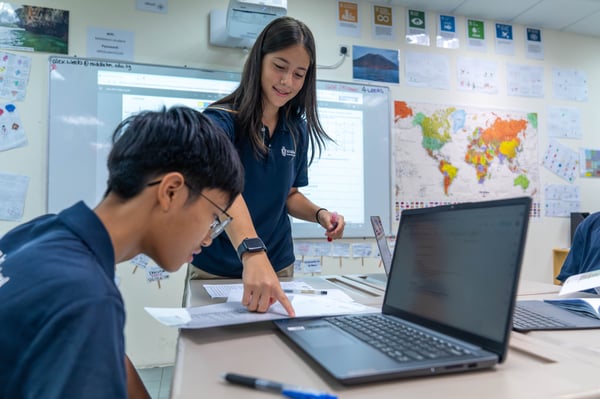
Susan Sawarkar
Exams can bring a mix of emotions; it could be excitement, motivation, and sometimes a bit of stress. It’s natural to want to do your best while feeling the pressure to perform well. Whether you are preparing for your IGCSE exams in the secondary or A-levels exams in the high school level, remember that these feelings are completely normal. With the right habits and mindset, you can approach exams with a sense of calm, balance and confidence.
1. Start with a Plan
A good plan sets you up for success. Break your study sessions into smaller, focused blocks rather than spending long hours at a stretch. Use a planner to map out your subjects and revision schedule, and include regular short breaks to help your brain recharge. Begin with the subjects you find most challenging. Tackling them early builds momentum and gives you a confidence boost.
2. Take Care of Your Body

Your mind performs best when your body feels well. Eat balanced meals that include fruits, vegetables and protein to stay energised. Keep hydrated and avoid too much caffeine or sugary drinks. Try to get at least seven hours of sleep each night so your brain can rest and process what you have learnt. Light exercise or simple stretches before studying can help you feel focused and ready to start.
3. Keep a Positive Mindset
Exams are a way to show what you have learnt, not a measure of your worth. When you start to feel anxious, pause and take a deep breath. Recall the mindfulness moments from class, such as focusing on your breath, feeling grounded, or giving your mind a short pause to reset. Remind yourself, “I have prepared sufficiently, and I’ll do my best.” Replace unhelpful thoughts like “I can’t do this” with positive ones such as “I’ve got this, step by step.” Staying positive helps you focus and perform better.
4. Study with Purpose

Be intentional with your study time. Practise with past papers to understand how questions are asked. Use active recall strategies such as quizzing yourself or explaining a topic to a friend. Teaching someone else is one of the most effective ways to reinforce what you know.
5. Talk It Out
Looking after your mental wellbeing is just as important as preparing for the exam. Take breaks to do things you enjoy, such as listening to music, going for walks, or spending time with family. If you start to feel overwhelmed, reach out to someone you trust, whether it’s a teacher, parent or friend. Remember, you are not alone.
6. Celebrate Effort and Progress

Exams matter, but they are only one part of your learning journey. What truly counts is the effort you put in and the personal growth that comes with it. Every challenge helps you discover more about yourself. Stay calm, give your best effort, and take pride in how far you have come.
Final Thoughts
At Middleton International School, we prioritise both learning and wellbeing. As the mothership school for The Contentment Foundation, we guide students to approach challenges with balance and confidence. Here, learning goes hand in hand with wellbeing, and our aim is to nurture not only academic achievement but also the lifelong skills, resilience and curiosity that prepare students for personal growth and a fulfilling future.
Find out how Middleton supports students’ wellbeing and growth!

.jpg)